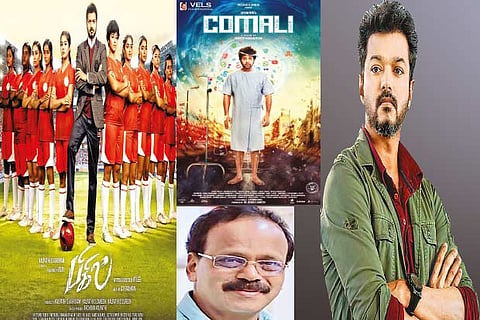

Chennai
Clearly, he would have understood after watching the film that it was not the case, but the idea of a coach with gangster background, training young women in football and winning national championship is the same.
Script writers and filmmakers must remember that as per the Copyright Act in the world, there is no copyright for story ideas.
A similar story idea can occur to anyone. But how one tells the story on screen cannot be the same. The copyright protection exists only for screenplay and not for the story idea or theme.
Honourable Justice K Chandru gave a judgment (dated 26/9/2012), on story theft case over the film Thaandavam, in which he referred a judgement by Supreme Court, which stated, “An idea, principle, theme, or subject matter or historical or legendary facts being common property cannot be the subject matter of copyright of a particular person. It is always open to any person to choose an idea as a subject matter and develop it in his own manner and give expression to the idea by treating it differently from others. When two writers write on the same subject, similarities are bound to occur because the central idea of both are single, but the similarities or coincidences by themselves cannot lead to an irresistible inference of plagiarism or piracy.”
He further quoted, the judgement given on the film Dasavathaaram (dated 22/8/2007), in which it was stated “It is true that in both the stories, the hero plays multiple roles. But we find that the stories are conceptually different and the entire storyline as well as the treatment of the story is conceived in a completely different style in both. A mere similarity of the idea cannot give a cause of action for breach of copyright.”
These two judgements must be clearly understood by every script writer and filmmaker, when claiming copyright violation by anyone against other filmmakers.
There were many films made with similar stories at the same time and released in the same year too.
For example, directorVasanth’s Poovellam Kettupar and director Pravin Kanth’s Jodi carried same storyline and were both released in 1999. Coincidentally, in both films Vijayakumar and Nassar played similar roles of head of feuding families.
Likewise, Vikraman’sVaanathaippola and Lingusamy’sAanandham carried similar storyline and were released back to back. Several such examples of films releasing with similar story-lines in all film industries exists.
But that does not mean, the writers and filmmakers were stealing stories as claimed by budding writers today. Unless they stole the screenplay and presented the story idea in the similar manner in which it was thought of by the original writer, copyright claim on a story and screenplay cannot be made legally.
Story theft claims are happening since 1936 in Tamil cinema.
The makers of Pathi Bakthi (based on a screenplay), went to court claiming that makers of Sathi Leelavathi copied their storyline.
The case resolved when the writer of Sathi Leelavathi, SS Vasan, testified that both films were inspired by Ellen Wood’s 1860 novel ‘Danesbury House’, therefore neither party could claim originality.
Like that, several cases were resolved as no one can claim ownership to a story idea. One can get inspiration from anywhere. But understanding the differentiation in its treatment is important.
Screenplay writers must register their script and ensure only registered scripts are given to others to read. That may prevent anyone copying the story idea and screenplay. Unfortunately, many script writers without even knowing what an upcoming film’s screenplay is, claim the story to be theirs simply based on the title or teaser or trailer.
They can claim ownership only if the screenplay matches with theirs. That can be known only when the film releases or if the filmmaker of the disputed film gives them their screenplay.
Without that, all claims of story theft are baseless and are at best a publicity stunt with an intention to gain attention.
Wish story writers understand the copyright law well before making such claims in future.
— Dr G Dhananjayan is filmproducer, distributor and founder-director of BOFTA Film Institute
Visit news.dtnext.in to explore our interactive epaper!
Download the DT Next app for more exciting features!
Click here for iOS
Click here for Android